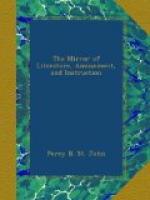Bachelors’ Wills.—Without any express revocation, if a man who has made his will, afterwards marries, and has a child or children, his will, made while a bachelor, will be presumptively revoked, both as regards real and personal estate, and he will be pronounced to have died intestate. The law presumes that it must be the natural intention of every man to provide for his wife and offspring before all others, and, consequently, in such a case, apportions his property according to the Statute of Distributions. But the fact of a marriage alone, without a child, is no revocation; and though both facts conjoin to revoke the will, yet such revocation is only on the presumption that the testator could not have intended his will to remain good. If, on the other hand, from expressions used by him, and other proof, it be made to appear unquestionable that it was his intent that his will should continue in force, the marriage and birth of children will not revoke it.
Paraphernalia of a Widow.—These are defined to be “such goods as a wife is, after her husband’s death, allowed to retain in preference to all creditors and legatees; as necessary wearing apparel, and jewels, if she be of quality; and whether so or not, all such ornaments of the person, as watches, rings, and trinkets, as she used to wear in her husband’s life-time. Under the term ‘wearing apparel’ are included whatsoever articles were given to her by her husband for the purpose of being made up into clothes, although he may have died before they were made up.” (Clamey.) It should be added, however, that the jewels of the wife are, after her husband’s death, liable to the payment of his debts, should his personal estate be exhausted; though her necessary wearing apparel is protected against the claim of all creditors.
* * * * *
SUPERSTITION OF SAILORS.
The following is from Messrs. Bennet and Tyerman’s Voyages and Travels: “Our chief mate said, that on board a ship where he had served, the mute on duty ordered some of the youths to reef the main-top-sail. When the first got up, he heard a strange voice saying, ‘It blows hard.’ The lud waited for no more; he was down in a trice, and telling his adventure; a second immediately ascended, laughing at the folly of his companion, but returned even more quickly declaring that he was quite sure that a voice, not of this world, had cried in his ear, ‘It blows hard.’ Another went, and another, but each came back with the same tale. At length the mate, having sent up the whole watch, run up the shrouds himself; and when he reached the haunted spot, heard the dreadful words distinctly uttered in his ears, ‘It blows hard.’ ’Ay, ay, old one; but blow it ever so hard, we must ease the earings for all that,’ replied the mate undauntedly; and looking round, he spied a




